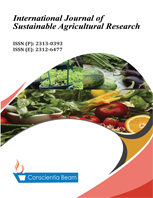Farmers Assessment of the Training and Visit Extension System in Niger State: Evidence from Fadama Ii & Iii in Mokwa Local Government Area of Niger State, Nigeria
DOI:
https://doi.org/10.18488/journal.70/2015.2.4/70.4.111.119Abstract
The Training and visit (T&V) extension has been criticized for being top-down, top heavy, inefficient and ineffective. The purpose of this study therefore was to assess the effectiveness of the T&V extension in Mokwa local government area of Niger state Nigeria. Three specific objectives guided the study. A total of 450,000 farmers who had been in active production between 2004 and 2013 evidence from (FADAMAII & III) in the LGA constituted the population for the study. A four percent sample (1,800) was randomly selected for the study. A structured questionnaire was used to collect the data, data were descriptively analysis. Demographically majority of the respondents were male aged 41-50 years, and married. slightly less than 5 percent (5.0%) were literate. Majority had been in the farming system for at least 11 years (53%) and had land holding almost exclusively by inheritance (96.0%). Other results indicate that majority of respondents has contact with Extension agents occasionally, most dependents on other source of agricultural information. Respondents reported that frequent level of Extension contact is unsatisfactory. But found information given by the Extension Agents useful. Majority of the respondents were aware of recommended agricultural technologies.

